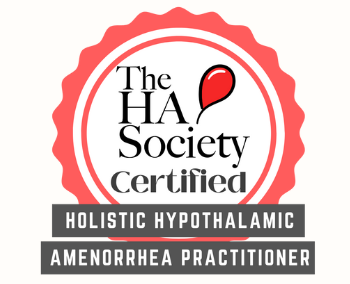Anorexia is a serious mental disorder, that can present itself in a variety of ways. To summarize the DSM-V, anorexia diagnosis is determined by the presentation of restriction of energy intake leading to significantly low body weight, intense fear of gaining weight or becoming fat, and disturbance in the way in which one’s body weight or shape is experienced. Recovering from anorexia is not a simple or easy process. It requires a team of support and professionals, and depending on the severity, the support team will differ. Ultimately, it is crucial to bring awareness to the disorder, shine light on it, and seek out help. Attempting recovery alone is difficult, and often times unsuccessful as there is no accountability, structure, or guidance.


Primary amenorrhea is when a woman of reproductive age, on average 15 and older, has NEVER had a natural period. This means she has never had a bleed or ovulated. As found in the research, primary amenorrhea is defined as the failure to reach menarche. Evaluation should be undertaken if there are no secondary sex characteristics by 13 years of age, if menarche has not occurred five years after initial breast development, or if the patient is 15 years or older. While there are different causes of primary amenorrhea, at Peak Valley Coaching we will focus mainly on PA that is caused by eating disorders and energy deficits. Primary amenorrhea can be fixed by addressing the underlying issues including nutritional deficiencies, physical stress, and psychological stress.
Hypothalamic amenorrhea (HA) also referred to as secondary amenorrhea can be described as a cessation or complete stop of a menstrual cycle for at least 3 consecutive months. Some studies and articles state 6 months, but generally 3 months is what is agreed upon and used to determine if a woman has HA. The good news is hypothalamic amenorrhea is completely reversible. Since the cause of HA is related to psychological stress, excessive exercise, disordered eating or a combination of these factors resulting in suppression of the hypothalamic–pituitary–ovarian axis, it is possible to address these issues.
Hypothalamic Amenorrhea & Eating Disorders


The brain is powerful, which can have positive and negative effects on a person. With recovery and health we want to harness our brain's power in a positive manner. This means it is important to use our thoughts to drive change. Habits are the cornerstone of recovery, but the hard part is breaking old habits and replacing them with new ones. It can be done, but it takes consistency and time.
Along with healing our mind, we also need to heal our bodies. Of course a lot of this healing will be done through diet and rest, but once the body is in a healthier state it will be important to add in mobility, stretching, and exercises that promote further recovery. If you are an athlete or someone who enjoys being active, this especially applies to you. In order to fix imbalances, tightness, and immobility, it will be important to incorporate regular healing exercises.

